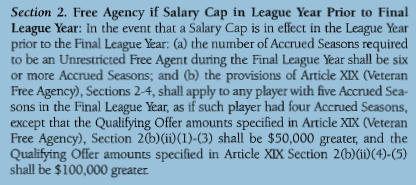The 2009 NFL regular season has not yet started, and already, people can’t help but to wonder what the NFL will look like in 2010, when there will be no salary cap. The absence of a salary cap will only occur if league owners and the NFLPA cannot come to an agreement on a new collective bargaining agreement before March 2010. Many high rankings individuals in both camps see a new agreement before 2010 as a long shot.
So let’s say that there is no salary cap in 2010. Shawn Hoffman of Squawking Baseball thinks that we will hardly notice a difference. While the Redskins and Cowboys may go on a short spending spree, many teams may actually lower their payrolls because of the lack of a salary floor (currently around 85% of the cap). I could see the Jaguars spending much less on players since they can’t find people to fill the seats in their stadium.
Also, take into consideration that the players who would normally be the most prized free agent signees, may not be available on the market. For a full rundown on the rules in what the NFL Collective Bargaining Agreement calls the Final League Year, you will have to scroll down to page 237 of the CBA and focus on Article LVI. Once you are there, you’ll notice things like,
As Pat Kirwin noted in his piece on NFL.com from over a year ago, this section means that, every player from the 2005 draft who signed a five-year contract and every player who signed a four-year deal in 2006 would miss out on eligibility for free agency and revert back to their club as a restricted free agent. This is normally the most coveted group of free agents who would be in position to command a large salary in an uncapped year. The owners were smart to get this section in the CBA.
And the much loathed Franchise Tag will expand. 2 tags will be available to teams instead of the standard 1 tag. And then there is the Final Eight Plan, found on page 77 of the CBA and listed under Article XXI. As Kirwin summarizes it, the plan will
restrict the final eight teams in the playoffs from signing free agents. The final four teams shall not be permitted to negotiate and sign any unrestricted free agent to a player contract except for players who acquired their status by being cut or were on the final four team when their contract expired. Playoff teams five thru eight get a break to sign one player with a salary of $4,925,000 or more and any number of players with a first-year salary of no more than $3,275,000 and an annual increase of no more than 30 percent in the following years.
There is a mechanism to permit the final eight teams to sign an unrestricted free agent for each one of their own unrestricted free agents who sign with another club as long as they don’t spend more than what their own lost player received from his new club.
Much more devastating than an uncapped season for the league would be a lockout in 2011. Scrapping an entire season or even forfeiting any regular season match-ups can be devastating for a league. Just ask the NHL (lockout) and MLB (which had a player strike), leagues that fought hard to regain a strong presence among its respective fan bases.

